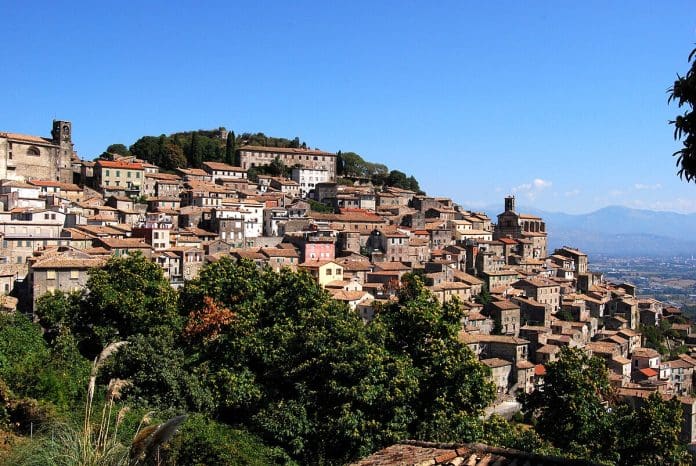Over the past few years, Italy’s one-euro-home sales have drawn a lot of attention, with dozens choosing to purchase abandoned properties in some of the country’s sparsely inhabited areas.
However, other municipalities have found it difficult to sell their vacant houses, even though towns like Mussomeli in Sicily and Zungoli in Campania have been able to sell a variety of abandoned properties to foreigners hoping to live the Italian dream.
One of these is Patrica, a secluded medieval village south of Rome with only 3,000 residents, where over 40 properties that were abandoned in the early 1900s have been allowed to decay. Patrica is a picturesque place in central Italy, perched on a rocky plateau with a view over the Sacco Valley, but in the past, the residents’ lives weren’t always simple.
Vacant Houses
Many moved away, leaving their homes unoccupied for decades as they sought better opportunities elsewhere. The mayor of the town, Lucio Fiordaliso, has been attempting to revive the fading village by following in the footsteps of other Italian villages that have successfully sold their empty houses for one euro, or slightly more than a dollar. He hasn’t had much luck thus far. “We attempted to sell only two houses for one euro after mapping all abandoned houses and formally contacting the original owners to request that they turn over their run-down family properties,” Fiordaliso told CNN.
This isn’t the situation for Patrica and other similar communities, even though local authorities in towns left underpopulated by earthquakes and other natural disasters have the authority to list abandoned homes for sale without the owners’ consent.
According to Fiordaliso, “We first need the owners’ or their heirs’ availability in disposing of their old houses.” With their permission only then can we list these homes for sale, which adds a great deal of complexity to the process. Nearly unfeasible. According to Fiordaliso, ten owners responded favorably to the town’s “public call to involve them in our one-euro-homes project,” but they ultimately withdrew. None of the others ever responded.
Call To Public Officials
According to Fiordaliso, people who had second thoughts might have done so due to disagreements with other relatives who had equity in the same property. In ancient Italian towns, abandoned houses are occasionally divided among several heirs who each hold a portion, such as a kitchen, balcony, or bathroom. According to Italian law, nothing can be sold without the approval of all heirs in writing. Children used to inherit portions of their family house, such as orchards, wells, and small plots of land, according to tradition. However, there’s no assurance that a relative would remain cordial and/or stay in touch years later.
“Most relatives who shared the same property were at odds with one another for personal reasons or couldn’t agree on the sale; some hardly spoke or knew each other, while others lived in distant cities and even abroad,” the mayor claims. As a result, the disposal of potential one-euro residences faced an impasse. There have been cases where heirs never formally divided a home, leaving the ownership line fractured and unclear as to who should be the rightful owner today.
Fiordaliso claims that it has been extremely difficult to locate the descendants of owners who had long since relocated abroad, primarily to the US, Canada, and Argentina. These owners may have had other last names or may have sold their Italian property to foreigners without informing Patrica’s town hall.
He continues, “It’s like trying to find a needle in a haystack.” The two abandoned homes that Patrica was able to sell as part of its one-euro strategy belonged to two locals who owned them outright; hence, there was no need for them to coordinate with fourth-degree cousins or great-great-grandsons in order to sell the properties.
Links To Family
When there are family conflicts, relatives may decide not to sell their portion for retaliation or legal reasons related to inheritance disputes. Additionally, long-term absentee owners could be reluctant to reveal their whereabouts to the authorities for fear of facing unpaid electricity bills, back taxes on their property, and waste disposal fines of up to 2,500 euros ($2,730) per year.
The state of the abandoned dwellings in Patrica may also be a factor in why the One Euro program never truly took hold there. Even if the owners were prepared to sell, some of the houses are just too dilapidated.
Gianni Valleco, a native of Patrica, and his two brothers decided to put their parents’ deserted home up for sale to see what would happen, but they quickly discovered that the house was in very poor condition. “We reasoned, ‘Why not try it?'” There would be no more needless stones in our possession, even if it was only for one euro. According to Valleco, “We were curious to see if someone might be interested in buying it anyway.”
“We knew that, after fifty years, our parents’ house had been reduced to rubble—it had been completely demolished. There was an open space with bushes and grass covering it because the roof and most of the walls had collapsed. The only thing that was left was an unsightly garden situated in the middle of the historical center. Valleco claimed that a neighbor had been utilizing the house’s remnants to dispose of their old belongings.
Then, he continues, “We realized nobody would ever buy it.” “The house needs a lot of money to rebuild, thus it’s a horrible investment. Investing in a little country cottage in the area makes more sense. Thank goodness, not every abandoned house in Patrica that could fetch a euro for sale is in such appalling condition, and some have attracted interest from purchasers.
A few visitors from abroad came to view the deserted one-euro homes. The mayor states, “There was a lot of interest, but sadly we had nothing to offer them. The interested parties were from the US and Europe. To attract newcomers, Fiordaliso has been devising fresh strategies to enhance the town’s allure in the meantime.
Fresh Plan For Patrica
Some residents decided to completely renovate and repurpose their old family homes after decades of abandonment, as the town council recently provided funding for the renovation of the outside façades of several historic palazzos. Alessandra Pagliarosi, a local, went one step further and transformed her husband’s 1950s mansion into the classy Patricia Bed & Breakfast.
“We renovated the inside and the roof, which was almost nonexistent before. After sitting there pointlessly for a while, the mayor’s move finally offered us a decent cause to thoroughly refurbish the property, says Pagliarosi, who profited from the new tax cuts the town council implemented to boost the local economy.
If someone chooses to open a business in the historic area, such as a bed and breakfast or artisan store, they will receive tax credits for restructuring expenses and a ten-year exemption from paying taxes on trash disposal, advertising, and public space use.
“It would mean a total of about 1,200 euros (about $1,310) in tax savings per year for a small B&B, which is a significant amount of money,” notes Pagliarosi. The tax incentives are also available to foreign nationals who intend to establish a small business and move to Patrica. As a result, so far, one restaurant and two new B&Bs have opened.
Several American descendants of emigrant families recently visited Patrica to look at properties, according to local realtor Ilario Grossi, who operates the Immobil Lepini estate firm in the nearby village of Ceccano.
However, the town’s ready-to-move-in residences turned out to be more desirable, with two-bedroom apartments starting at 20,000 euros ($21,832). “There is interest, but many foreigners would rather choose turn-key apartments that are already restyled or just require minor repairs when they actually see the bad shape of the old homes,” adds Grossi.
Therefore, purchasing one of these contemporary models is far more practical than opting for an older structure that would require extensive renovations, which would increase the overall cost. Even if it means mediating a dispute between rival cousins, Fiordaliso isn’t giving up on selling some of the town’s long-neglected homes in spite of these obstacles.






